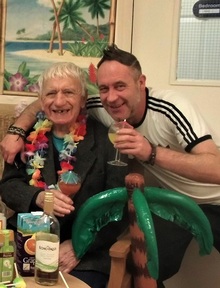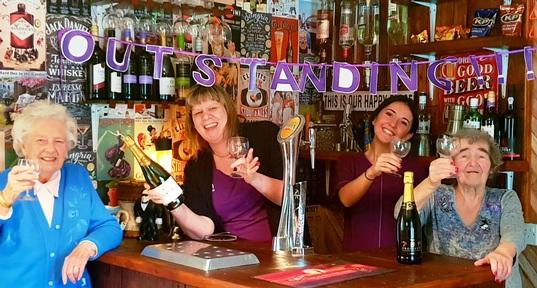Lost teeth and the art of red bag care: How vanguards improve care of elderly
How do you make an old man feel relaxed in hospital? Find his teeth. A decent start it may be, but what about a woman who hasn’t walked in years?

Doctors are not known for stupidity but this educated elite spent weeks trying to help a man from a care home get out of bed and walk, when access to care home notes would have told them he’d been wheelchair bound for years. Medical staff have been clearly scratching their heads over what ‘normal’ for care home residents looks like.
Important details like this have been fueling hospital discharge delays for years and taken the ‘personalised’ out of care for many care home residents.
Figures from NHS England show that more than a million hospital days were lost due to delayed discharges in 2015. In 2012-13, more than one million people were readmitted to hospital as an emergency within 30 days of discharge. This cost the NHS £2.4bn.
Ambulance crews have also been delayed while care home staff put an ill resident’s paperwork together and many residents go to hospital without spare clothes or the right medication.
False teeth going missing
Medical teams often haven't got enough information about a resident’s clinical needs and make several calls to care homes to get details. Personal belongings, such as false teeth are also not being transferred or could be lost while residents are in hospital.
The Government’s ‘vanguards’ (50 in total) are part of the NHS’ Five Year Forward Plan and are finding solutions to such issues. These vanguards are local NHS and care consortiums, created in 2015 to test out new ideas for better NHS care.
Speedy patient transfers
At ‘Sutton Homes of Care‘ vanguard, the introduction of a 'red bag' has speeded up patient transfer between hospital and care home settings. Medicines, spare clothes, contact details, details of current health conditions and what a ‘normal day’ for the patient looks like are all kept in a red bag that goes with care home residents to hospital. When they are discharged, a ward nurse ensures all the paperwork is updated and personal belongings are sent back with the resident.
But this is not just a victory for common sense, the red bag has improved communication and relationships between hospital and care homes, meant fewer phone calls made by hospital staff to care homes looking for health information and smoother, quicker admission and discharge processes.
If a resident passes away, red bags go back to their loved ones, who have been so thankful to receive the personal possessions, some have told staff their faith in the NHS as a caring institution had been restored. Led by the NHS Sutton Clinical Commissioning Group (CCG), the vanguard gives better care for 1,000 residents in more than 70 care homes across Sutton.
Viccie Nelson, care home director at NHS Sutton CCG, says “Since we’ve carried out the red bag initiative, we’ve had positive feedback from both care home staff and residents’ families.”
He admits it has “speeded up transfer, and reduced the number of calls that the hospital makes to the home from around five or six for each resident to just one.”
Professor Gillian Leng, deputy chief executive of NICE, and director of health and social care, says: “It is important that people experience a smooth and timely transition from hospital back to their care home or own home.
“Sutton’s red bag approach is an innovative way tackling these problems, yet is striking in its simplicity.”
Sutton is one of six vanguards known as ‘Enhanced health in care homes’ which are piloting innovations into how care home residents can receive better healthcare and rehabilitation services. Six nursing homes in Sutton have each nominated two staff members to be care co-ordinators, working in a team of GPs, pharmacists, physiotherapists, medical staff and others to achieve continuity of care. Care home staff have undergone training in safeguarding, end-of-life and other areas to increase their skills.
CCGs, local authorities, GPs, nurses, hospital consultants, pharmacists, mental health specialists, physiotherapists and voluntary groups are some of the partners working together in local vanguards.
The vanguard ‘Stockport together’ has reduced its hospital appointments by 50 per cent by proactively monitoring residents to identify illnesses at an early stage and managing appointments away from hospital. This is thanks in part to a recognised GP lead in each of the eight neighbourhoods.
A ‘hotline’ between hospital consultants and GPs is speeding up patient treatment and reducing hospital appointments in Stockport. GPs can call ‘Consultant Connect’ during patient appointments to get instant treatment advice from a specialist at Stepping Hill Hospital and check whether a referral is necessary.
A new single number connects GPs to a ‘rota’ of consultants and if the first is unavailable, the system redirects it to the mobile phone of the next specialist. This system has prevented hospital referrals in 70 per cent of recorded cases since February.
At 77, Jean Hamilton had been suffering from low blood pressure which led to two visits to A&E.
Her GP Dr Simon Woodworth said: “Usually I would have referred the patient to Stepping Hill, which would have led to a letter and an appointment three to four weeks later. Instead, I called Consultant Connect and within 25 seconds I was through to a consultant endocrinologist.”
The consultant agreed with the GP, to adjust her medication and carry out blood tests, with a plan to call the consultant again if needed, after getting the test results.
Jean’s husband, Charles said “Before changing her treatment, Jean had to keep lying down all the time and she collapsed twice.
“Since Dr Woodworth changed her blood pressure pills, Jean has been able to get out and about again. If we’d had to wait weeks for a hospital appointment, I think it might well have meant the blue lights again and Jean back in hospital.”
A vanguard in Wakefield has also seen personalized care achieved with care home residents with specific interests being linked to people within the community. One resident told care staff of a desperate wish to be able to speak to someone in his mother tongue before he died. By making contact with someone in the local area, the care home was able to grant him that wish.
Poker nights for the boys
To stop men feeling isolated, one care home helped them organise themselves socially. Eleven men started a men’s group to have poker nights and watch football matches as a group.

At Gateshead’s vanguard, ward rounds take place with care workers proactively going to hospitals to help get people back to their care home. Six older people have been trained to be ‘champions’ and give their input.
The Health+Care Show in London’s Excel on 29-30 June, brings NHS clinicians, care workers, councils, CCGs together and featured a number of sessions about vanguards.
In a speech at the show, William Roberts, NHS England’s national lead for enhanced care in care homes, said local ownership makes the national vanguard programme a success.
He highlighted ‘a difference in culture and language’ in health and social care and the challenge in making the two understand each other. Issues identified by vanguards included a need for a named and consistent GP working with care homes, good end of life care, nutrition and even IT. Mr Roberts believes linking health and social care data sets is absolutely critical and emphasises better use of technology in care homes.
What does success with a new idea look like?
Reduction in 999 calls, A&E attendances and calls to out of hours GP services as well as fewer delayed transfers of care, 'polypharmacy' and medication errors are some of the wins being celebrated.
But as William Roberts says “It isn’t about paradigm shifts”. Small changes can make just as big an impact to someone's well-being.
He adds “I know some people who would rather access Netflix not listen to Vera Lynn singing ‘Roll out the barrel’.”
Latest Innovative Care News
 13-May-19
'Pink drink' brain cancer treatment rolled out across NHS in memory of Baroness Jowell
13-May-19
'Pink drink' brain cancer treatment rolled out across NHS in memory of Baroness Jowell
 25-Apr-19
Louis Tomlinson helps 83-year-old who lost wife to dementia complete bucket list
25-Apr-19
Louis Tomlinson helps 83-year-old who lost wife to dementia complete bucket list
 22-Mar-19
UK's top care home handyman takes residents to pub for pie and pint
22-Mar-19
UK's top care home handyman takes residents to pub for pie and pint
 12-Feb-19
Michael McIntyre's jokes tested to see if they stop elderly catching flu
12-Feb-19
Michael McIntyre's jokes tested to see if they stop elderly catching flu
 07-Jan-19
'We were lucky to find it': Family's delight as care home is rated Outstanding
07-Jan-19
'We were lucky to find it': Family's delight as care home is rated Outstanding